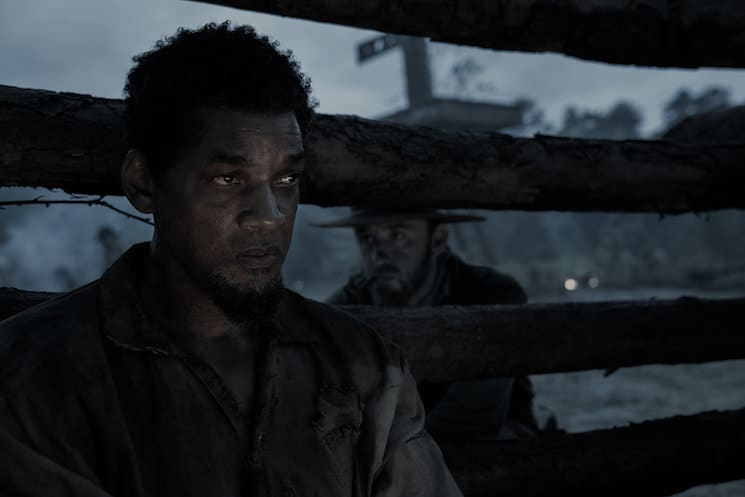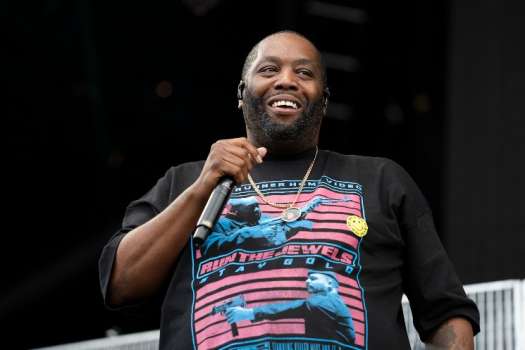It's incredibly rare when a story so extraordinary, harrowing and humbling is made to enter the realm of the mundane. Antoine Fuqua's Emancipation is the sole Antebellum-set historical epic that accomplishes this feat, rendering its true tale of endurance, perseverance and hope utterly forgettable. Middling in every sense of the word, Fuqua's feigned tug at the heartstrings is fundamentally lacking on both a storytelling and technical level, mumbling its way through an obvious commentary and failing to find a meaningful, contemplative or visually inventive angle with which to approach its all-too-important figure. Ultimately becoming nothing greater than an epic deluded by its own limited scope.
Will Smith, continuing his streak of strong performances in films that are anything but, stars as the enslaved Peter, the famously photographed "Whipped Peter" whose heavily lashed back emboldened the Abolitionist Movement. Peter escapes from a plantation and heads towards Baton Rouge where Abraham Lincoln's army is encroaching on the floundering Confederates. However, a perilous, crocodile-infested swamp stands between him and freedom, as he hopes to not only grasp liberation, but reunite with his wife and children before a ruthless slave catcher, Fassel (Ben Foster), closes in on him.
Emancipation has the potential to either be an action-stuffed, euphoric work of Blaxploitation or a pure prestige drama. However, Fuqua, in tandem with screenwriter William N. Collage, settle for a bland middle ground that insists on using the harrowing historical framework to make up for the conventional, formulaic filmmaking. Though sharing DNA with Edward Zwick's Glory and Steve McQueen's 12 Years a Slave, Emancipation's central journey lacks both the subversiveness and humanization of those two features, sketching a sparse outline of an epic but wholly lacking the technical, thematic and cinematic intensity to shade them in. Consequently, the film fundamentally fails to observe little else besides the fact that slavery was indeed, bad.
The staid, uninventive craft is a result of Fuqua's insistence on having sweeping imagery supplant earned emotion, as the journey heads towards its saccharine conclusion without the vigour of tightly choreographed action or the pathos of poignant dialogue. This effect is amplified by how misshapen its cinematography is with the black and white imagery noticeably washed out, lacking both depth and texture. The endless array of drone shots transforms this would-be treacherous swamp into a dull environment of wasted potential with the use of harsh lighting and deep shadows repeatedly trounced in favour of scale. This precarious chase from enslavement to freedom is so inarticulately and insipidly realized, it defies logic and becomes harrowing for all the wrong reasons. Marcelo Zavros' laborious, overly-familiar score only serves to add salt to the wound.
While the decision to go monochrome is intended to cement an austere, apocalyptic landscape, none of it is rendered memorably. Each sequence bleeds into one another in a lulling fashion, failing to either plaintively or vigorously showcase the atrocities and plights its protagonist endures. From the uneventful inciting incident to the ineffectually executed final battle, Fuqua chooses bombast over carefully articulated conflict, ensuring Peter's despair is equally felt by the tortured audience.
Moreover, Fuqua and company also fail to take advantage of Peter's Haitian ancestry, neglecting to imbue his arduous journey with Creole culture and religion. Couple this with Fassel repeatedly telling Peter that he is his "God," and there exists the possibility of Emancipation being a deft interrogation of the role religion played in both fuelling slavery and giving hope to those who endured it. But Collage and Fuqua instead move on to what they know best: ill-conceived action.
In another world where Smith didn't slap Chris Rock at the Oscars, his performance would have been a compelling attempt to garner a second Academy Award nomination in as many years. For Smith, Peter is a far cry from the prototypical roles that he takes on as he immerses himself in the world of the dishevelled and bitterly scarred. While his accent leaves a bit to be desired with it trapped in a flat emotional range, his physical transformation is impossible to ignore. His slightly hunched posture epitomizes the saying, "Bent but not broken," adding additional weight to Collage's superficial screenplay right until he's made to say that exact epithet.
Foster tries his best to underpin his character with multifaceted dimension, but Fassel never becomes anything greater than a pale imitation of every other bigoted slaver in film. The inability to inject personality into each of the characters limits the film to convention at every turn, as the audience is forced to glean emotional arcs and payoffs from caricatured husks that faintly resemble people.
For a film about liberation, Emancipation is ironically too constrained to movingly capture it. Fuqua's latest lacks the courage of its real-life figure, afraid to provoke, ponder and penetrate anything beyond its surface-level look at the worst of American history.
(Apple TV+)Will Smith, continuing his streak of strong performances in films that are anything but, stars as the enslaved Peter, the famously photographed "Whipped Peter" whose heavily lashed back emboldened the Abolitionist Movement. Peter escapes from a plantation and heads towards Baton Rouge where Abraham Lincoln's army is encroaching on the floundering Confederates. However, a perilous, crocodile-infested swamp stands between him and freedom, as he hopes to not only grasp liberation, but reunite with his wife and children before a ruthless slave catcher, Fassel (Ben Foster), closes in on him.
Emancipation has the potential to either be an action-stuffed, euphoric work of Blaxploitation or a pure prestige drama. However, Fuqua, in tandem with screenwriter William N. Collage, settle for a bland middle ground that insists on using the harrowing historical framework to make up for the conventional, formulaic filmmaking. Though sharing DNA with Edward Zwick's Glory and Steve McQueen's 12 Years a Slave, Emancipation's central journey lacks both the subversiveness and humanization of those two features, sketching a sparse outline of an epic but wholly lacking the technical, thematic and cinematic intensity to shade them in. Consequently, the film fundamentally fails to observe little else besides the fact that slavery was indeed, bad.
The staid, uninventive craft is a result of Fuqua's insistence on having sweeping imagery supplant earned emotion, as the journey heads towards its saccharine conclusion without the vigour of tightly choreographed action or the pathos of poignant dialogue. This effect is amplified by how misshapen its cinematography is with the black and white imagery noticeably washed out, lacking both depth and texture. The endless array of drone shots transforms this would-be treacherous swamp into a dull environment of wasted potential with the use of harsh lighting and deep shadows repeatedly trounced in favour of scale. This precarious chase from enslavement to freedom is so inarticulately and insipidly realized, it defies logic and becomes harrowing for all the wrong reasons. Marcelo Zavros' laborious, overly-familiar score only serves to add salt to the wound.
While the decision to go monochrome is intended to cement an austere, apocalyptic landscape, none of it is rendered memorably. Each sequence bleeds into one another in a lulling fashion, failing to either plaintively or vigorously showcase the atrocities and plights its protagonist endures. From the uneventful inciting incident to the ineffectually executed final battle, Fuqua chooses bombast over carefully articulated conflict, ensuring Peter's despair is equally felt by the tortured audience.
Moreover, Fuqua and company also fail to take advantage of Peter's Haitian ancestry, neglecting to imbue his arduous journey with Creole culture and religion. Couple this with Fassel repeatedly telling Peter that he is his "God," and there exists the possibility of Emancipation being a deft interrogation of the role religion played in both fuelling slavery and giving hope to those who endured it. But Collage and Fuqua instead move on to what they know best: ill-conceived action.
In another world where Smith didn't slap Chris Rock at the Oscars, his performance would have been a compelling attempt to garner a second Academy Award nomination in as many years. For Smith, Peter is a far cry from the prototypical roles that he takes on as he immerses himself in the world of the dishevelled and bitterly scarred. While his accent leaves a bit to be desired with it trapped in a flat emotional range, his physical transformation is impossible to ignore. His slightly hunched posture epitomizes the saying, "Bent but not broken," adding additional weight to Collage's superficial screenplay right until he's made to say that exact epithet.
Foster tries his best to underpin his character with multifaceted dimension, but Fassel never becomes anything greater than a pale imitation of every other bigoted slaver in film. The inability to inject personality into each of the characters limits the film to convention at every turn, as the audience is forced to glean emotional arcs and payoffs from caricatured husks that faintly resemble people.
For a film about liberation, Emancipation is ironically too constrained to movingly capture it. Fuqua's latest lacks the courage of its real-life figure, afraid to provoke, ponder and penetrate anything beyond its surface-level look at the worst of American history.




